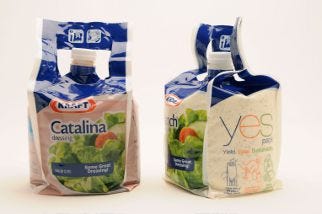At Kraft Foods' annual meeting on May 23, 2012, shareholder advocacy group As You Sow petitioned the company to report on extended producer responsibility (EPR) for its post-consumer packaging.
"Kraft—a major user of packaging worldwide—has been silent on this critical sustainability issue," said Conrad MacKerron, senior program director at As You Sow, in a press release (read the entire release here). "At a time when governments across the country are focusing on conserving natural resources, reducing waste, and finding it increasingly difficult to maintain services in the face of budget deficits, Kraft and its peers must take responsibility for the massive amount of packaging waste they generate in the U.S., as they have done in many other countries."
Kraft spokesperson Richard Buino sent Packaging Digest the company's response on extended producer responsibility, as it relates to its larger framework for addressing packaging sustainability:
"At Kraft Foods, we regard sustainability as a strategic global business priority—it's about conducting business in a way that is environmentally, socially and economically responsible.
"As explained in our Delicious World report, product packaging—including the design, choice of materials and post-consumer treatment of packaging—is one of the six focus areas of Kraft Foods' sustainability framework. We take a comprehensive approach to packaging—one that cuts waste, conserves natural resources and is satisfying to the end user. We set and meet goals, we're proud of our accomplishments to date and we're committed to our goals for the future. Here are some of our recent activities and achievements:

Kraft YES pouch
● "Between 2005 and 2010, we cut more than 100,000 metric tons (200 million pounds) of packaging from our supply chain.
● "Since 2010, when we announced our expanded sustainability goals, we've cut an additional 20,500 metric tons (45 million pounds) of packaging from our supply chain—towards our goal of eliminating another 50,000 metric tons (100 million pounds) by 2015.
● "We're working to incorporate more sustainable materials into our packaging. To help increase recycling rates, we're using more recycled content in much of our packaging. In North America, for example, a majority of people can recycle more than 70 percent (by weight) of our packaging.
● "We've been using lifecycle assessment (LCA) to help us better understand how to reduce our environmental impacts. LCA measures the footprint of what goes into making a product, from farm to fork and beyond. Packaging is part of this approach and it's helping us make the right changes and get the best results. The LCA work builds on our multi-year footprinting project to map Kraft Foods' total impact on climate change, land and water use.
● "We're involved in several initiatives around the world aimed at improving recycling rates, both at the company level and as part of industry efforts. In the U.S., we've been involved with the Sustainable Packaging Coalition and the Grocery Manufacturers Assn., with industry-wide collaborative efforts to address waste management across the lifecycle.
● "We also co-lead the Consumer Goods Forum's Global Packaging Project under which many of the world's largest consumer goods companies and major retailers have approved a suggested set of common definitions and principles for packaging in the framework of sustainability. We are investing in new recycling technologies such as the Enval Consortium along with peer companies to enable higher recycling opportunities.
"Because we can demonstrate that our policies, practices and reporting are already moving us in the right direction, we do not believe that a report on the adoption of an ‘extended producer responsibility' policy would be an effective use of our company's resources or in the best interest of our company or our shareholders. Rather, we believe this is a shared responsibility (not just for manufacturers), which is why we're working with others to find realistic solutions.
"Our strategy reflects our belief in the efficacy of partnering with other stakeholders including private, governmental and non-governmental organizations. We believe creating consumption patterns that are sustainable requires that everyone does their part: from individual consumers to private organizations to public policymakers; and a lasting solution will require a comprehensive approach that includes public education, public-private partnerships, changes in public policy and the enhancement of infrastructure.
"Kraft Foods' sustainability program is based on research and thoughtful design. As we continue our sustainability journey, we'll have more insight into where we can make the greatest difference."
.
About the Author(s)
You May Also Like




